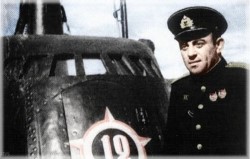
Aleksandr Kautskii
Aleksandr Kautskii was born in 1906 in Kherson, south Ukraine. His father Moisei, who worked at a sawmill, died of typhus in 1919 and his mother died in 1921. Aleksandr finished only three classes of a common school. In 1918 he began working as a courier, then he worked at a flourmill and at a creamery. In 1928, he was drafted into the Red Navy and sent to a school for submariners. Until 1934 he served on a D-3 submarine as a senior motor mechanic, then he was transferred to the Northern Fleet, based in the Barents Sea. In 1938, Kautskii completed a course at a naval officers' school of the Frunze Navy Academy in Leningrad. He continued his service with the Northern Fleet as the commander of a mine and torpedo group. In July 1941, Kautskii was promoted to the rank of lieutenant captain (corresponding to that of lieutenant in the U.S. Navy) and became deputy commander of a submarine of the SHCH ("pike") class. In August 1942 he became the captain of the submarine SHCH-402. He was awarded four military orders.
In September 1944, at the distance of 5.5 nautical miles from Gamvik, Norway, Kautskii's SHCH-402 was sunk by mistake by the Soviet torpedo-carrying "DB-7 Boston" (A-20 Havoc) plane. Kautskii perished along with the rest of the crew. The newspaper The Submariner Veteran wrote:
"The renowned submarine perished during its 16th combat sortie, at the time when victory was approaching close, and only a few days stood before the men of the Northern Fleet and the liberation of the Soviet Arctic and northern Norway. This unexpected and absurd loss was especially bitter and hard for the entire Fleet and, especially, for the submariners. No one wanted to believe that one of their best crews, headed by native of Kherson Aleksandr Kautskii, would never return to the sea".
For decades Soviet official memorialization of the Soviet-German war remained silent about this incident, thus omitting from history the name of the war hero Aleksandr Kautskii. (This presumably reflects the responsibility for this naval disaster of Admiral Arsenii Golovko, the wartime commander of the Red Northern Fleet, who after the war, in the 1950s and early 1960s, was deputy commander of the entire Soviet Navy). Only in the 1990s was Kautskii's name recalled by Russian veterans of World War II.






